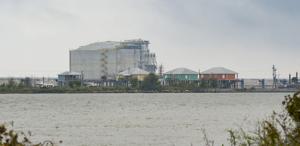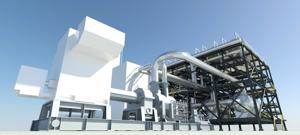
About a month ago, Repsol asked the Federal Energy Regulatory Commission to step in the Spanish energy firm’s simmering fight with Venture Global LNG, the Virginia company building a liquefied natural gas empire in Louisiana.
In 2018, Repsol signed a 20-year contract with Venture Global LNG for 1 million metric tons annually of the product. Shipments were supposed to start once Venture Global LNG’s Calcasieu Pass export terminal in Cameron Parish achieved full commercial operations.
However, in an April 14 motion, Repsol said Calcasieu Pass had yet to reach full commercial status — even though the terminal had exported 128 cargoes since March 2022. Feeling swindled, Repsol asked FERC to intervene.
In an April 26 response, Venture Global LNG said Repsol’s claim that it hadn’t delivered any LNG to its customers was false and that the plant was authorized to operate “under terms and conditions mutually agreed to by its customers.” It also blasted Repsol for filing the motion four years after FERC gave the greenlight for construction of Calcasieu Pass.
However, Venture Global LNG admitted — as it also did in a March 28 letter to FERC — that Calcasieu Pass “has experienced certain reliability challenges that are delaying its commercial operations.” Those challenges include issues with power generating equipment, according to federal filings.
Because Repsol filed its motion so long after FERC’s construction approval, the commission swiftly denied Repsol’s request May 3. A Repsol attorney did not respond to messages asking whether the company would challenge the ruling.
However, the documents shed light on what industry analysts said is a unique situation — an LNG plant taking so much time to finish construction and reach full commercial operations, despite shipping cargoes for a year.
The technicality is that Calcasieu Pass is still in the “commissioning” phase — an industry term meaning the facility isn’t finalized but is in good enough shape to export some cargoes.
It isn’t out of the ordinary for an LNG plant to export during the commissioning phase, analysts said. FERC’s 2019 construction order even outlined a framework for the terminal to do just that.
However, the length of Venture Global’s commissioning phase is an anomaly, analysts said — though it could become a blueprint for other LNG exporters.
“It just raises a very interesting loophole that Venture Global has exploited,” said Tyson Slocum, energy program director for Public Citizen, a consumer advocacy nonprofit in Washington. “All the other active LNG developers on the Gulf Coast, they’re looking at Venture Global and they’re looking to speed up their construction as quickly as possible to start exporting before the commencement of ‘commercial operations’ so that they can enjoy the kind of profits that Venture Global is currently experiencing.”
‘Extensive repairs’ needed
When asked for comment for this story, Venture Global LNG officials deferred to the company’s FERC filings.
In those filings, Venture Global LNG said the facility’s “unique modular, midscale design” requires a lengthy commissioning process that is still underway. Construction of the plant started in 2019.
The March 28 letter said Calcasieu Pass has undergone “significant commissioning activities” to prep for full commercial operations beginning this year, though a specific date was not revealed.
The company also touted the efficiency with which Calcasieu Pass was built — it began shipping LNG three years after construction started — and that 75% of its cargoes went to Europe amid heightened demand for LNG. It said company officials would keep in communication with FERC “to ensure the most accurate information” about commercial operations is shared with its customers and regulators.
A U.S. Energy Information Administration LNG report says Calcasieu Pass’ first nine trains — the vessels where natural gas is super-cooled and liquefied — began commercial operations in May 2022. The remaining nine trains have yet to reach that point.
The March 28 letter identified “daily corrective, testing and rectification work” at the site. It includes fixing horizontal heat recovery steam generators, which help power steam turbine generators. The generators had experienced “failures” because of water leaks in two of the units.
The company said the units will need “extensive repairs and replacements.” As a result, Venture Global LNG told its long-term contract customers that full commercial operations would be delayed.
“While Calcasieu Pass is indeed able to produce LNG, it remains in the commissioning phase because it continues to face periodic reliability challenges impacting the facility,” Fory Musser, Venture Global’s senior vice president of development, wrote in the letter.
That letter appears to be the impetus for Repsol’s FERC request. It was cited on the second page of the firm’s FERC filing.
FERC officials declined further comment on the Venture Global LNG-Repsol fight.
Longer than usual
Though U.S. LNG plants are routinely allowed to ship cargoes during commissioning, the standard timeline for that phase is about two to four months, said Charlie Riedl, executive director of the Center for LNG, an industry lobbying group.
Cheniere Energy’s Sabine Pass LNG terminal, the largest in the nation by export volume, took roughly two months to commission. Calcasieu Pass, meanwhile, has taken at least a year.
“There has not been a startup of a commissioning phase that has lasted anywhere near this long,” Riedl said of Calcasieu Pass.
The legal brouhaha is significant because Venture Global raked in cash by selling LNG on the spot market last year instead of shipping it to customers with long-term contracts, which are key to financing billion-dollar LNG plants, said Slocum, the Public Citizen official who closely tracks the federal regulatory process.
Natural gas prices spiked in 2022 amid Russia’s invasion into Ukraine, though the price difference between European and Asian gas and U.S. gas remained wide.
“By exploiting this ‘commercial operation’ definition loophole, Venture Global, rather than its customers, has been able to profit off of the difference between those global benchmarks, earning it a ton of money — likely hundreds of millions of dollars in windfall profits that its customers are not very happy about, for obvious reasons,” Slocum said.
The Venture Global-Repsol fight may be an anomaly. Riedl said he hasn’t seen a similar situation where LNG customers have turned to FERC over shipment delays.
“I would say this is a pretty unique situation relative to the rest of the facilities that are in operation here in the U.S.,” Riedl said.
He added that the U.S. LNG market is still strong.
“It almost it feels like on a weekly basis that we’re seeing announcements of new purchase agreements that are rolling through the facilities that are either operational, and we’re seeing talks of expansions at facilities,” he said.


Leave a Reply